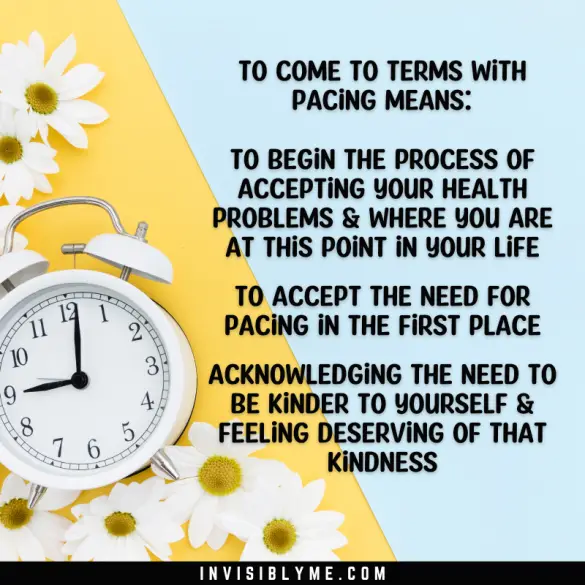
4 things to remember when pacing yourself if you have a chronic illness, fatigue or pain
Caz, who has fibromyalgia and ME/CFS and runs the blog Invisibly Me, shares her post on four things to remember when trying to pace yourself – all lessons that she has herself had to apply to her life and found tricky but extremely helpful.
If you’re living with chronic illness, chronic fatigue and/or chronic pain, you’ve probably come across the term “pacing”. Maybe you’ve got the knack of it, maybe you’re still figuring it out, or maybe you find it a continual work-in-progress, as I do.
While it can be vital for keeping us balanced in our day-to-day lives, it doesn’t mean it’s not super frustrating. Here are three things to think about and remember when it comes to pacing.
1. It’s okay to delegate – if you can
If you find it hard to give a task over to someone else because you want to be in control of it, or because you don’t feel you deserve the help, then you may end up taking on more than you can reasonably manage when you don’t have to.
Not everyone has someone they can delegate to, for instance with housework or running errands, so they have little choice but to pay for outside help or take it all on themselves.
If you do have someone in your life that cares about you and is willing to help, chances are they’d appreciate the chance to do it and to feel useful.
It’s a two-way street, because you’ll be there for them whenever you can, too, so it’s not unfair or cheeky to ask for a helping hand.
Also, if help isn’t volunteered, it’s okay to ask for it. It’s not always easy, and sometimes it feels downright impossible, but it is doable. Don’t let shame or pride get in the way of reaching out, whatever the scenario may be.

It could be that you want emotional support when you’re exhausted and have a lot on your plate to stress about, or you want some hands-on help to tackle your to-do list.
If a friend was in your shoes, you’d want to help them if you could. You’d likely encourage them to ask for help, so treat yourself as kindly as you would that friend.
2. You may not get everything done… and that’s okay
This is a really difficult one for me. When it seems that most things on your to-do list are priorities and everything has to be done, you can’t delay things for too long or cut anything out.
It’s worth asking yourself whether such things really are priorities, and whether they even really have to be done. What will happen if they don’t get done today, or ever?
If the aforementioned things are necessary, can they wait? If it’s not urgently time-sensitive, try to build in more flexibility to the things you do.
Feeling as though everything has to be done right now just puts more pressure on yourself and you end up totally frazzled with way too much to do in one day. You likely already have too little time because you lose a lot of your day to not being well enough or functional enough to do anything.
At some point, you may need to admit that it’s not possible to get everything done. Like literally not possible because there’s not enough time, let alone that you’ll totally run yourself into the ground if you continue to push beyond your capacity.
Acknowledging that not everything you wanted or needed to do will get done can suck, big time. It’s frustrating but it’s not a failure.
This is where the flexibility comes in to be able to say “mañana”. There’s always tomorrow, whenever and however you can manage it.
Try the Pocket Book of Pacing and Pacing sticky notes to help you pace yourself and manage your day.
3. Taking breaks is vital, not selfish
“Self-care isn’t selfish” – It sounds cheesy and we’ve probably all heard this expression hundreds of times lately, but it’s true and it’s often not appreciated enough.
Looking after ourselves is important, and taking breaks is part of that. It helps prevent burnout, or it at least takes the edge off it.
It’s self-care when we’re actively doing something to help our health, and if we choose things that are good for us during those breaks, then we can likewise help our mental health, too.
Part of pacing is building in regular rest breaks, be it 10 minutes or two hours. It’s totally up to you and your needs as to how you pace your days and it’ll likely vary depending on the circumstances, but getting those breaks is vital.
Regular breaks can include anything you want. Some people find that building in small things they enjoy is most beneficial for their mental health. Perhaps it’s 10 minutes of your favourite TV series, half an hour of colouring, taking a nap, or 20 minutes with your pet.
There are different types of breaks for different purposes, and they’ll use different energy levels.
For instance, pacing breaks may be to give you mental calm, physical rest, inspiration or motivation. They may be relaxing breaks, productive breaks or enjoyable breaks.
Most things we do use energy, whether we’re aware of it or not, and that drains the battery we’re trying to recharge. Crossword puzzles, reading a good book, or stressing yourself silly over something all take up precious energy. Keep that in mind when factoring in rest times.
Try to have some extra low-energy breaks in the day, even if it’s just 5 minutes to start with, where you can just rest, let your thoughts wander without judgement, ease off the stressing, and just relax. Mindfulness or meditation practices are beneficial for some people.
Low energy breaks will hopefully give your body and your brain a brief break to recharge. Without any of these breaks, a cycle can develop that’s hard to break.
When there’s too much to do, you stress yourself mentally and physically trying to get through it. You overdo the activity and your pain and fatigue increase and you start to get irritable. Healthy eating and self-care might decrease.
If you don’t get everything done you get more stressed, and then you might get resentful at being so busy and having zero time to do anything you enjoy. Then the cycle continues. This is a cycle I seem to have been in pretty much non-stop.
This is one of those “do as I say and not as I do” posts because I’m a huge hypocrite in this regard. But it would be great if others doing similar could acknowledge this pattern and move away from it because it really does make you utterly miserable, and it doesn’t help our health or our pain at all.
Take a look at these 5 products to help manage fatigue and chronic illness.
4. Pacing takes time to warm to
For those going from a pre-illness life to one that is hindered by low energy, pain and other health problems, the change in your capabilities can be stark and depressing.
It’s easy to let your mind wander to how things used to be and how you’d get so much done in any given day. Then you look at how things are now, where some days getting out of bed or having a shower are monumental achievements.
Or perhaps you’re still highly functioning because you’re driven by guilt and extensive to-do lists, and while you still get things done you constantly feel like it’s never, ever enough.
To come to terms with pacing means to at least begin the process of accepting your health problems and where you are at this point in your life.
It’s acknowledging what you can and can’t do, what you need to do to look after yourself and what works best for you when going about your day-to-day life.
To pace yourself means to accept the need for it in the first place. If you’re struggling with acceptance – something I find insanely difficult and a continual work-in-progress – or you’re often replaying mental movies of the pre-illness days, then accepting the need for pacing and actually doing it will likely be a lot harder.
Pacing also means acknowledging the need to be kinder to yourself. That means feeling like you actually deserve that kindness and realising that’s not something you need to earn.

It can take time and you might need to dig a little deeper if you’re finding yourself resistant to it or getting frustrated continually.
For instance, I’m predominantly powered by guilt and thrive on being busy. Feeling as though I’ve never done enough powers me forward and keeps my mind off the bigger, deeper things I don’t want to think about.
Without this busyness, I can succumb way more easily to pain and fatigue. Sometimes that might be a good thing, but not always. Getting a balance isn’t easy but it would make for a more level approach to your day-to-day life.
A sense of achievement and being useful, as well as being able to enjoy the things you want to do, is great. But when things get to be too much, it’s time to ease off the gas and look at why you’re pushing yourself so much.
It’s usually better to aim for long-term balance with regular breaks than have your body enforce a break on you, where you’ll pay the price for days thereafter.
I still find it immensely frustrating pacing myself, but I also see the importance of it for my mental and physical health. Fibromyalgia, migraines, chronic pain, nerve damage, autoimmune disease, lung damage, it all adds up.
Nonetheless, it’s easy to berate yourself for not dealing with it “better” or for not doing enough. It’s also easy to compare yourself to others, thinking about how they may have it “worse” than you.
But there is no comparison. Our experiences are uniquely our own and there are many issues that impact how we manage things, mentally and physically.
Getting into more of a routine when possible can be comforting and helpful for some people, myself included. It’s not always doable because health problems can be unpredictable at the best of times, but pencilling in regular breaks every so often is a good start.
Maybe build in things to look forward to, such as a 2.30pm tea break with biscuits, 20 minutes of your favourite TV series, or half an hour napping. Whatever floats your boat.
Breaks, distractions and pacing are all ways to help us better manage illness, stress and pain, so you need to find what works well for you and adjust it to what you need at that moment in time.
It’s a lot of pressure just getting through the basics day-to-day with chronic illness, pain or fatigue, let alone taking on household chores, decluttering, work, grocery shopping, blogging, or whatever else it may be.
Whatever it is you’re doing and whatever health issues you’re dealing with, pacing can be incredibly important both physically and mentally.
Pacing looks different for everyone. It’s okay to struggle with it, but try to remember why it’s helpful and realise that you deserve to be looking out for yourself.
By Caz
Read more of Caz’s posts by visiting her blog Invisibly Me, and follow her on Facebook, Twitter and Instagram.
More on Disability Horizons…